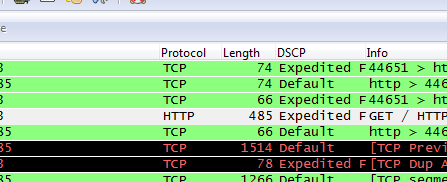I found myself having to review some VoIP traffic related queries this week and while viewing a few packet captures realised there wasn’t and easy way to see what traffic was being tagged with different DSCP values.
I googled around for a little while and found that you can actually add a DSCP column to your wireshark view by following these steps:
1. Right click on one of the existing columns.
2. Click on column preferences
3. Click Add down the bottom
4. Click on the “New Column” Label and change it to “DSCP” then hit enter once.
5. With the new entry highlighted, change the Field Type to Custom (in the dropdown box)
6. In field name, copy and paste in ip.dsfield.dscp
7. Click Apply/Ok
You can drag the column back to the left side of the Info column (this was my preference as it’s easier to see) and you now have a simple view of the tag for any packet.

Bonus: Here’s a table of DSCP and TOS values in their most common formats for reference.
| TOS (Dec) |
TOS (Hex) |
TOS Precedence Name |
TOS Delay flag |
TOS Throughput flag |
TOS Reliability flag |
DSCP (Hex) |
DSCP (Dec) |
DSCP/PHB Class |
| 0 |
0x00 |
Routine |
0 |
0 |
0 |
0x00 |
0 |
none |
| 4 |
0x04 |
Routine |
0 |
0 |
1 |
0x01 |
1 |
none |
| 8 |
0x08 |
Routine |
0 |
1 |
0 |
0x02 |
2 |
none |
| 12 |
0x0C |
Routine |
0 |
1 |
1 |
0x03 |
3 |
none |
| 16 |
0x10 |
Routine |
1 |
0 |
0 |
0x04 |
4 |
none |
| 32 |
0x20 |
Priority |
0 |
0 |
0 |
0x08 |
8 |
cs1 |
| 40 |
0x28 |
Priority |
0 |
1 |
0 |
0x0A |
10 |
af11 |
| 48 |
0x30 |
Priority |
1 |
0 |
0 |
0x0C |
12 |
af12 |
| 56 |
0x38 |
Priority |
1 |
1 |
0 |
0x0E |
14 |
af13 |
| 64 |
0x40 |
Immediate |
0 |
0 |
0 |
0x10 |
16 |
cs2 |
| 72 |
0x48 |
Immediate |
0 |
1 |
0 |
0x12 |
18 |
af21 |
| 80 |
0x50 |
Immediate |
1 |
0 |
0 |
0x14 |
20 |
af22 |
| 88 |
0x58 |
Immediate |
1 |
1 |
0 |
0x16 |
22 |
af23 |
| 96 |
0x60 |
Flash |
0 |
0 |
0 |
0x18 |
24 |
cs3 |
| 104 |
0x68 |
Flash |
0 |
1 |
0 |
0x1A |
26 |
af31 |
| 112 |
0x70 |
Flash |
1 |
0 |
0 |
0x1C |
28 |
af32 |
| 120 |
0x78 |
Flash |
1 |
1 |
0 |
0x1E |
30 |
af33 |
| 128 |
0x80 |
FlashOverride |
0 |
0 |
0 |
0x20 |
32 |
cs4 |
| 136 |
0x88 |
FlashOverride |
0 |
1 |
0 |
0x22 |
34 |
af41 |
| 144 |
0x90 |
FlashOverride |
1 |
0 |
0 |
0x24 |
36 |
af42 |
| 152 |
0x98 |
FlashOverride |
1 |
1 |
0 |
0x26 |
38 |
af43 |
| 160 |
0xA0 |
Critical |
0 |
0 |
0 |
0x28 |
40 |
cs5 |
| 176 |
0xB0 |
Critical |
1 |
0 |
0 |
0x2C |
44 |
voice-admit |
| 184 |
0xB8 |
Critical |
1 |
1 |
0 |
0x2E |
46 |
ef |
| 192 |
0xC0 |
InterNetworkControl |
0 |
0 |
0 |
0x30 |
48 |
cs6 |
| 224 |
0xE0 |
NetworkControl |
0 |
0 |
0 |
0x38 |
56 |
cs7 |

